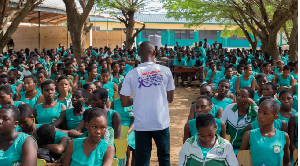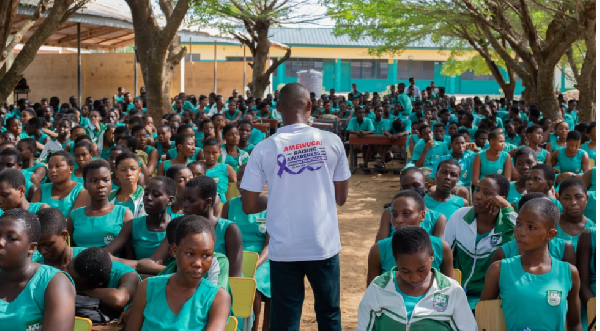 The commitment was made during a school outreach programme at Three-Town Senior High School
The commitment was made during a school outreach programme at Three-Town Senior High School
The Anti-Human Smuggling and Trafficking in Persons (AHSTIP) Unit of the Ghana Immigration Service (GIS), Aflao Sector Command, and its partners have pledged to work together to combat human trafficking in border communities.
Human trafficking—which involves the recruitment, transportation, transfer, harbouring, or receipt of people, including children, women, and men through force, fraud, or deception, for the purpose of exploitation and profit—has become rampant along certain routes in the Volta Region.
This commitment was made during a school outreach programme at Three-Town Senior High School (SHS) in Denu. The outreach was organised by the Handmaids of the Divine Redeemer Sisters Foundation (HDRSF), an indigenous Catholic women’s religious congregation, and the International Centre for Safe Migration (ICSM), in partnership with the AHSTIP Unit.
The event formed part of the “Amewuga” advocacy campaign against human trafficking in border communities. The campaign aims to raise awareness about human trafficking and the protection of migrants’ rights, mobilise community action, build the resilience of women, girls, and children against modern-day slavery, abuse, and exploitation, improve support systems for victims, and ultimately reduce trafficking incidents in border communities.
Sister Regina Ignatia Aflah, Assistant Superior General of HDRSF, said the Foundation is committed to promoting education, protection, and the empowerment of women and girls to help them realise their full potential. She reaffirmed the Foundation’s dedication to collaborating with ICSM and the AHSTIP Unit to raise awareness, rescue and care for trafficked victims, and protect girls from exploitation and abuse in border communities.
Deputy Superintendent of Immigration (DSI) Justice Kudzo Normeshie, the Officer in charge of the AHSTIP Unit, GIS Aflao, expressed the Unit’s readiness to promote gender-responsive migration management. This includes eliminating gender-based migrant vulnerabilities to protect women, girls, children, and youth from modern-day slavery, sexual and labour exploitation, and all forms of abuse.
Assistant Commissioner of Immigration (ACI) William Bannerman-Williams Hans, Deputy Sector Commander, Aflao GIS, on behalf of the Service, thanked the sponsors for their commitment to supporting the Service’s mandate—especially in the areas of capacity building and awareness creation on human trafficking. He assured the audience of the Sector’s readiness for future partnerships.
The programme, which was attended by about 2,300 students, teachers, and management members of Three-Town SHS, featured a dramatization by the school’s drama group. The performance illustrated the elements of human trafficking, highlighting cyber trafficking as an emerging trend to help sensitise attendees.
Some students who spoke to the Ghana News Agency expressed gratitude for the education received and promised to share the lessons with others to promote vigilance, which is essential in preventing this violation of human rights.
The “Amewuga” project, which draws on an Ewe cultural value that teaches that human life is more valuable than money, resonates with the target audience—including commercial motor riders, drivers, and border residents. This cultural relevance strengthens the impact of the campaign message, as it is deeply rooted in traditional values.
The initiative aligns with the policy of mainstreaming migration risk awareness at the Aflao Sector Command.


